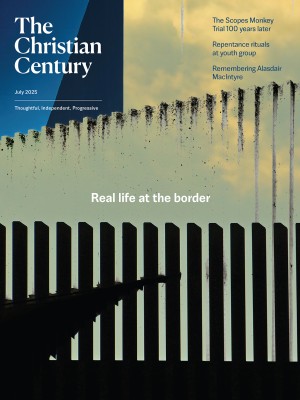
Illustration by Jorge González
Some time ago a man I know well died. I had gotten to know him over several years: his upbringing in a faraway land, his career in a caring profession, his courage and dignity in being prepared to walk with people whom the world despised and shunned, his faith and integrity, and later his struggle with life-threatening illness and the choices he had to make about the risks and possibilities of drastic treatment.
I know he died because he told me. He died on the operating table and remained dead for about 45 minutes. But somehow the physicians managed to bring him around and complete the ambitious procedure in such a way that, after some days, he was able to leave the hospital. A couple of weeks later I asked, “How’ve you been?” He replied, “I died a fortnight ago.”
Read our latest issue or browse back issues.
But what he said next startled me far more. “I want to tell you what I saw when I died,” he said. “I saw Jesus clothed in white, with outstretched hands, and I saw myself being carried toward him by four people. My late father, late mother, and late brother were all holding me, the way we carry the body of Jesus out of the church in the Passion play on Palm Sunday. And there was a fourth person. The fourth person was you.”
I jumped out of my skin. We were surrounded by people, by the hubbub of church coffee hour. A couple was waiting to talk about a wedding, an asylum seeker wanted me to sign forms for her application to remain in the UK, and some visitors from North Carolina hoped to exchange stories about my Duke days. I spotted someone who’d just lost her sister and wanted to see how she was doing.
But this was from another planet. I tried to screen out the noise and buzz of our company and to take in what he was telling me. This is a man who communicates not by loud voice or expansive gesture but by understatement and the twinkle of an eye. He wasn’t telling me about a dream. He said that he’d been dead, that wherever he’d gone to wasn’t a reconstruction of unresolved memories and unfulfilled desires. It was whatever lies beyond us, or at least beyond him.
I rapidly assembled what I knew. He testified he’d seen three family members. OK—that’s not a wild proposal; a lot of clergy try to persuade folk there’s more to heaven than a family reunion, but encountering loved ones who have died is about as basic to expectations of life beyond death as you can get. Nothing out of the box there.
But what was I doing there?
I guess some clergy like the idea of leading their flock into the hereafter. I recalled stories of priests who were buried with their coffins turned the opposite direction from the others, so that on judgment day they could lead their people to glory. Not hitherto my model of ministry, but I’m flexible. More significantly, how could I be still alive and yet be with this godly man in heaven? I thought of Colossians: “For you have died, and your life is hidden with Christ in God” (3:3). I quizzed the man for more details—Was anyone else around? Was God there? How long did all this go on?—but he was delphic in his inscrutability. He’d told me all there was to tell.
Since discovering I’m already in heaven, I’ve pondered our conversation deeply. I’ve thought about near-death experiences and explored all the explanations about chemicals in the brain. I’ve considered the usual accounts of seeing oneself on the operating table from an upper corner of the room.
But why do I have the reflex to push this away, to find a quasi-scientific narrative? I’m a pastor. My job is to be with people as they contemplate the deepest issues of their lives, to refuse to run away when they’re going nearer the bottom of the pond than I can deal with. Diverting to explanations is running away.
Since that encounter, I’ve thought about how in congregational ministry it can be pretty simple to plan weddings, sign forms for migrants, welcome visitors, even remember and express care for those bereaved. But with a head and heart full of such things, one can miss—or at least not have the emotional capacity for—the real business of God. What I want in a pastor is someone who’s always ready for this kind of conversation—about what’s going on in heaven right now—and isn’t so preoccupied with the bustle of leading a community that they don’t realize they’ve stumbled into forever.
I’ve also considered the chattering classes: how so much of the world is given over to comment and horror and gasps of approval or blame as instant judgments are made on provocative images that elicit strong reactions and heighten the temperature yet truly edify no one. How the church is absorbed in such a culture and mimics the rapid reactions and quarrels over things the news cycle will tomorrow leave behind. And I’ve wondered if I spend enough time on the things that really matter, with the people in whom the Spirit is doing extraordinary things.
But most of all I’ve recognized how today God sends prophets who have more variety in their ministry than simply denouncing the powers, who actually speak tenderly in ordinary conversations about remarkable things. I once read about someone who said he knew a person who was caught up—whether in the body or out of the body he didn’t know—into paradise and heard things that are not to be told. Actually I know him, too. He told me about it the other day.







